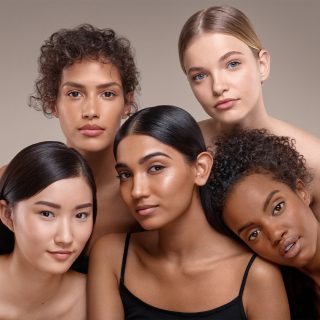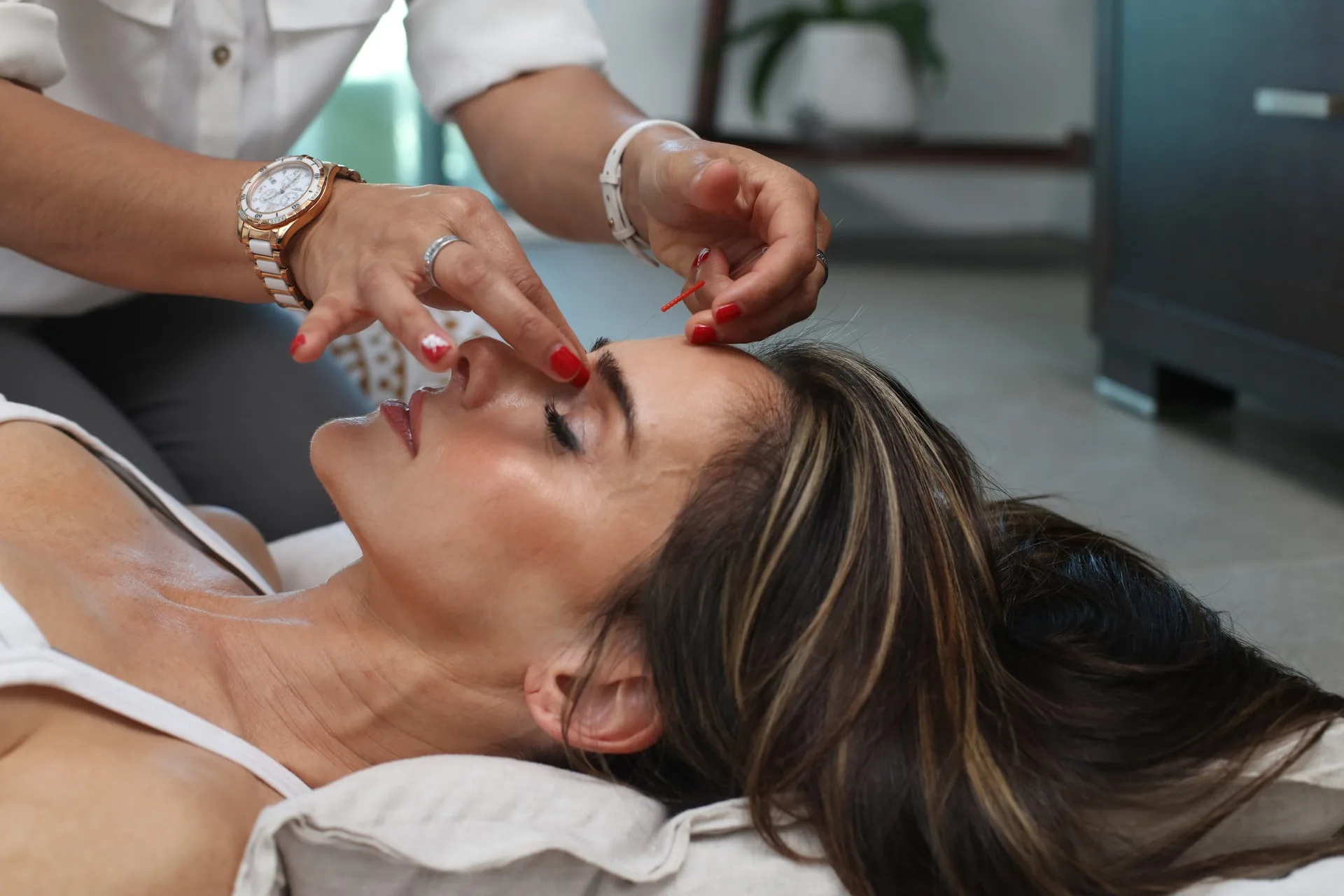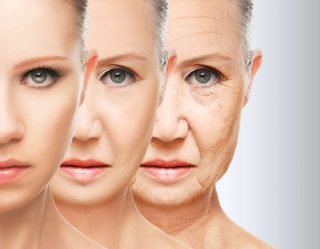As we age, so do the lipids, those natural oil and fat components that prevent moisture loss, which begin to deteriorate, resulting in dull, lifeless skin. Here’s how to anti-age your skin.
This aging process can be accelerated, not just in hot, sunny environments, but also in cold, dry and windy conditions. The water in your skin rises to the surface to hydrate other skin cells, but as soon as it comes into contact with air, it evaporates, leaving your skin dry.
Moisturizers allow your skin to retain moisture by improving its barrier function and preventing the loss of water. However, topical moisturizers don’t add any water to your skin. What increases your water levels are ingredients like ceramides, fatty acids and cholesterol.
It’s also vital to drink plenty of water and avoid caffeinated drinks, to help hydrate you from the inside out.

Hormones and your skin
Hormones can also be responsible for the look and texture of your skin, especially sex hormones such as testosterone, progesterone and estrogen.
“We generally have a surge of hormones at puberty, starting at age 10. Throughout our lives they wax and wane, until our post-menopausal period, when they decline,” explains dermatologist, Dr Noori Moti-Joosub. These hormones play a huge role when it comes to acne and pigmentation.
Your Skin Can Activate or Inactivate Hormones
Other hormones that influence our skin’s health are human growth hormones, thyroid hormones and cortisol. Our skin is also responsible for producing hormones. Dermatologist Marianne Duvenhage says: “The skin is now regarded as the largest endocrine organ; it forms steroid or sex hormones, stress hormones, insulin-like hormones and vitamin D.” Duvenhage explains that the hormones interact with skin structures called receptors.
Our skin can activate or inactivate hormones; for example, our adrenal glands form the inactive precursor sex hormones, and then the skin activates them. Chronological aging is due partly to reduced secretion of hormones from the various glands, which leads to the characteristic body and skin changes, as well as behavioural changes.
Hydrating your skin in your early 20s
“In men and women in their early 20s, the skin is at its best, with optimum levels of all the hormones,” says Duvenhage. The fluctuating teenage hormones have probably settled, estrogen levels are quite high, which results in the skin looking hydrated and wrinkle-free – as estrogen stimulates the formation of skin-smoothing collagen and oils.

Late 20s and early 30s
“At this stage of a woman’s life, the ratio of estrogen to progesterone and and androgen is usually quite balanced, and this should be reflected in the skin,” says Dr Ela Manga, integrated medical practitioner and medical director of Woodlands Centre for Wellbeing and Spa.
Anti-Age Your Skin With Less Stress
However, the body may be taking strain from excessive stress, as we try to balance our work and social lives. Unhealthy eating, cigarette smoking and alcohol start to reflect in the skin. “High stress levels and emotional factors can put a great deal of strain on the adrenal glands and they go into overdrive,” explains Manga.
Prolonged and high levels of stress will not only affect the adrenal glands, but impact on the entire endocrine system. The skin always reflects underlying imbalances in the endocrine system and bowel. The skin looks dull and will be prone to breakouts.
Melasma or Mask of Pregnancy And Your Skin

Another common issue is during pregnancy, when you may develop melasma or the “mask of pregnancy”, which is attributed to an overproduction of melanin, a natural substance in the body that gives pigmentation to the hair, skin and eyes. Fortunately, you don’t have to live with melasma. A product like ClearifiRx , which is a customized, prescription-strength cream for melasma can help you restore your clear complexion after you have given birth.
Pregnancy, childbirth and consecutive pregnancies can cause the endocrine system to go into shock. Polycystic ovaries are also a concern. “Often, we see women who have an under-active thyroid or insulin resistance that is part of PCOS, and often it begins with strain on the adrenal glands,” says Manga. The thyroid gland produces a hormone called thyroxine which influences the skin’s appearance. Too much thyroxine shows smooth, sweaty, flushed skin, while under-activity of thyroxine produces a dry, coarse thickening of the skin, with reduced ability to sweat.
Anti-Age your skin in your mid 30s and 40s
Many of the factors from your early 30s are still relevant. You will also see the effects of aging, wrinkling, loss of elasticity, sun damage and free-radical damage from an unbalanced lifestyle.
“Progesterone is a hormone which suppresses the breakdown of the proteins in the skin and is present in the skin up to about 40, which may be the reason why the skin appears so young up to then,” shares Duvenhage.
Anti-Age Your Skin In Menopause
As you age, your estrogen levels decline, which creates significant changes in the skin. Estrogen stimulates the formation of skin-smoothing collagen and oils. That’s why, as menopause approaches and estrogen production diminishes, not only does your body’s oil production slow down, but your body also loses its ability to retain moisture and dry, itchy skin becomes common. The skin becomes more fragile. It also loses elasticity, and becomes loose because the production of collagen is reduced.
Older skin appears paler, as the lack of estrogen also reduces the number of blood vessels in the skin.
Post-menopausal women will notice that, unlike on their scalp, facial hairs increase. This is because estrogen – which opposes the effect of testosterone – drops relatively more after menopause than testosterone.
Hormone facts:
- Western women now live a third of their life in menopause and men have at least 20 years of their life with partial androgen deficiency.
- The first hormone to exhibit a serum level change is melatonin, starting as early as five years, to 20 years of age. It stays on a low plateau until the age of 75.
- Growth hormones and DHEA (Dehydroepiandrosterone) continuously decrease from the age of 20 in males.
- In females, estrogens decrease rapidly after menopause and up to 60. Thereafter, it is on a low-level plateau.
Did you know?
- You can anti-age your skin with ingredients like antioxidants, which can be applied topically.
- If your skin’s barrier is functioning optimally, you are less likely to get infections or allergies.
- Some great ingredients to look out for include: AHAs as they are able to hydrate thick, sunburned skin; glycerin, which helps the skin attract and maintain its own moisture; and dimethicone, which helps seal in moisture.
- Stress is a trigger for many skin conditions.
The Bottom Line
You can anti-age your skin by understanding the different stressors that will harm your skin. Choosing the right products that are relevant for your age and stage of life goes a long way.
Here are Ten Anti-Aging Beauty Rules You Should Never Break.




![women [longevity live]](https://longevitylive.com/wp-content/uploads/2020/01/photo-of-women-walking-down-the-street-1116984-100x100.jpg)










